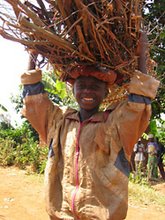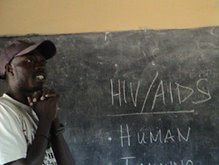Day 2: Thursday, February 8, 2007
I slept great and had an early morning breakfast with my colleague, Lisa Schechtman, GAA’s Senior Policy Officer. Lisa arrived in South Africa earlier in the week for an in-depth fact-finding mission on the state of the response to the crisis of violence against women and children. Click here to check out her blog!
After a challenging taxi ride that involved getting lost a couple of times, we finally arrived around 8:30 am for our first meeting at the headquarters of the Treatment Action Campaign (TAC) in Muizenberg, about 30 minutes outside of Cape Town. In case you aren't familiar with TAC, they are one of the world’s leading HIV/AIDS activist organizations. They have led the battle for treatment access in South Africa, and over the past year they have been building an "Access to Justice Campaign," which is focusing on combating violence against women and children. We had a great meeting with Linda Nafu, National Campaign Manager, Rukia Cornelius, National Manager, and Nono Eland, Treatment Literary Coordinator. What an amazing group of dynamic women! Lisa and I learned about the progress and the immense ongoing challenges facing our TAC comrades. Click here to learn more about TAC's campaigns!
South Africa is an incredibly dynamic country that is still birthing its own unique form of democracy. Having been liberated from the apartheid regime in 1994, it is fascinating to see how the people here are now fighting the government bureaucracy and political stagnation for their social and economic rights. The devastating impact of HIV/AIDS on South Africa is also forcing dramatic reforms of the health, education, and social protection sectors. It is clear that groups like TAC are critical in pushing for faster and bolder action and holding government and other stakeholders accountable for saving as many lives as possible. Viva TAC!
I was especially moved as Linda Nafu shared with us in a very open-hearted way her personal experiences with child sexual abuse over a nine-year period. Her story is featured on page 8 of the June 2006 issue of "Equal Treatment," TAC’s magazine. Click here to read it!
It was horrible to hear about the despair Linda experienced as she went to family members, teachers, and neighbors for help, but no one responded. Fortunately, Linda survived that trauma and went through years of therapy, so that she has transformed the pain of her experience into a passion for justice and action to protect her own children and all children who are subjected to sexual violence in South Africa.
Among children younger than 18, official statistics indicate that 1 out of 3 girls and 1 out of 6 boys experience sexual violence. Our TAC friends feel that this data represents a significant under-reporting of what is really happening, which is why they are launching their own national campaign to help stop the violence. I was very excited by TAC's impassioned commitment to tackle this problem in a comprehensive way.
We then visited TAC’s community-based programs in the Khayelistsha district in the Western Cape. Khayelistha is a 30-square-mile shanty town along the South Africa coast. Many of the poor people here live in hand-made wood and tin shacks that look like they'd topple over in a strong wind. There are some signs of progress. The government is building upgraded houses that are home to more and more people. But it was shocking to learn that approximately 60% of the people in this area are completely unemployed.
On Lisa’s blog, she describes our visit to Semalela, a model rape crisis center that brings together counseling, police reporting, medical care, and forensics collection at a single site. There are only six centers like this in all of South Africa.
Next we visited one of longest standing antiretroviral (ARV) treatment programs in Africa, which opened in 2001. We met with Marta Darder from Medicins Sans Frontieres/Doctors Without Borders (MSF), who helps coordinate a large ARV treatment program in Khayelistsha. They now are reaching 60% of those who medically require treatment and are moving toward universal access with prevention of mother-to-child HIV transmission programs. The success of these programs is truly inspiring. Mortality rates are declining, and they are close to eliminating pediatric HIV infection. The biggest problems facing the program are the shortage of health care workers and the lack of second-line drugs for those who develop resistance to first-line drugs. MSF and TAC are working vigorously to combat these challenges.
Our long day culminated with an unexpected visit to Robben Island. We traveled for about 35 minutes across choppy waters to visit the prison where Nelson Mandela and over 3,000 other anti-apartheid activists spent time during their decades of struggle. Mandela himself spent 27 years in prison and detention. For 18 years, he lived in a tiny cell about the size of a small bathroom in Cellblock A on Robben Island, with only a thin mat to sleep on.
The tour was led by a middle-aged man named Modisha (meaning shepherd) who spent five years imprisoned on Robben Island in the late 1970s and early 1980s for his student activism against apartheid. He graphically described the physical and psychological torture he experienced and the "blinding" rage it produced. He recounted his first hug from Mandela, who encouraged him to transform his rage into reconciliation, even while they were in the midst of an imprisoned hell. Modisha preached for South Africans to reject hatred and racism and to embrace forgiveness and tolerance. I’m starting to cry as I write this, as I feel so grateful and awed that a man like Modisha has the strength to heal himself so profoundly that he can stand in front of crowds of strangers each day and teach of all of us how to create a better, more peaceful world. This was one of the most incredible things I have ever experienced.
Friday, February 9, 2007
Subscribe to:
Post Comments (Atom)






No comments:
Post a Comment